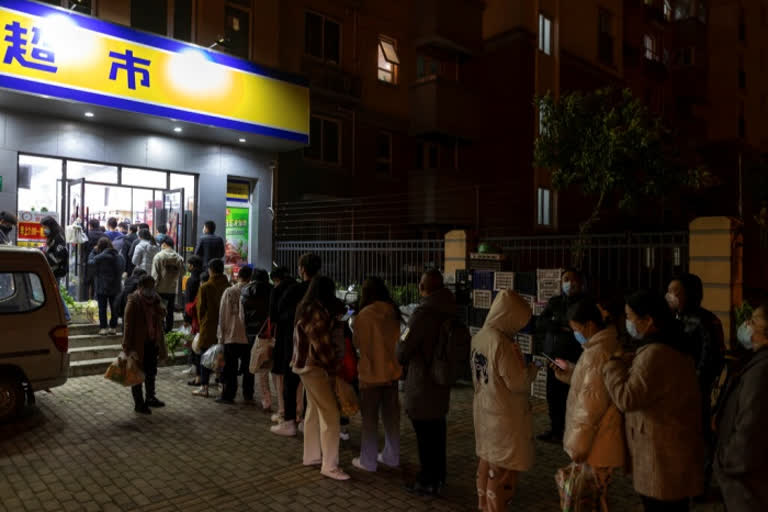Beijing: China began its most extensive lockdown in two years Monday to conduct mass testing and control a growing outbreak in Shanghai as questions are raised about the economic toll of the nation's "zero-COVID" strategy. China's financial capital and largest city with 26 million people, Shanghai had managed its smaller, past outbreaks with limited lockdowns of housing compounds and workplaces where the virus was spreading. But the citywide lockdown that will be conducted in two phases will be China's most extensive since the central city of Wuhan, where the virus was first detected in late 2019, first confined its 11 million people to their homes for 76 days in early 2020. Millions more have been kept in lockdown since then.
Shanghai's Pudong financial district and nearby areas will be locked down from Monday to Friday as mass testing gets underway, the local government said. In the second phase of the lockdown, the vast downtown area west of the Huangpu River that divides the city will start its own five-day lockdown Friday. Residents will be required to stay home and deliveries will be left at checkpoints to ensure there is no contact with the outside world. Offices and all businesses not considered essential will be closed and public transport suspended. Already, many communities within Shanghai have been locked down for the past week, with their housing compounds blocked off with blue and yellow plastic barriers and residents required to submit to multiple tests for COVID-19. Shanghai's Disneyland theme park is among the businesses that closed earlier. Automaker Tesla is also suspending production at its Shanghai plant, according to media reports.
Panic-buying was reported on Sunday, with supermarket shelves cleared of food, beverages and household items. Additional barriers were being erected in neighborhoods Monday, with workers in hazmat suits staffing checkpoints. In-person observations of the April 5 Tomb Sweeping Festival have been canceled and memorials will instead be held online. Some workers, including traders at the city's stock market, were preparing to stay within a COVID-19 "bubble" for the duration of the lockdown.
Li Jiamin, 31, who works in the finance industry, said she had packed several days of clothing and supplies, and her company was sorting out sleeping and eating arrangements. "The overall impact is still great," Li told The Associated Press, pointing especially to losses suffered by workers in the informal sector who have no such support. Huang Qi, 35, who works at a local university, said he had undergone a lockdown at home before and prepared for the new round by stocking up. "I think if the closure continues like this, our school workers will not be affected much, but what about those who work in the real economy? How can their business be maintained?" Huang said. "I still hope that our society can find a better balance between ensuring normal life and epidemic prevention and control," Huang added.
Also read:Stealth Omicron: China battles multiple outbreaks, reports 1,337 locally transmitted cases in a day
Shanghai detected another 3,500 cases of infection on Sunday, though all but 50 were people who tested positive for the coronavirus but were not showing symptoms of COVID-19. While people who are asymptomatic can still infect others, China categorizes such cases separately from "confirmed cases" — those in people who are sick — leading to much lower totals in daily reports. Nationwide, 1,219 new confirmed cases of domestic infection were detected on Sunday, more than 1,000 of them in the northeastern province of Jilin, along with 4,996 asymptomatic cases, the National Health Commission reported on Monday. China has reported more than 56,000 confirmed cases nationwide this month, with the surge in Jilin accounting for most of them.
